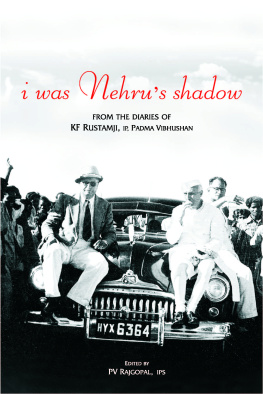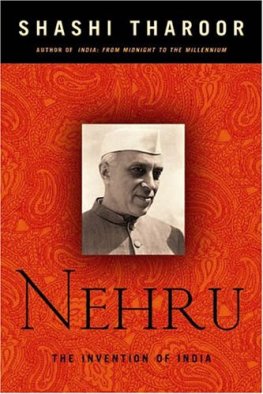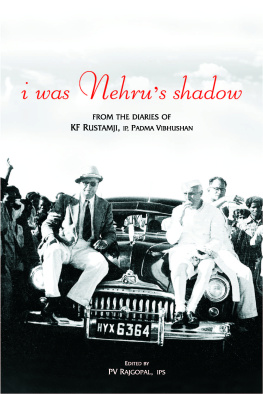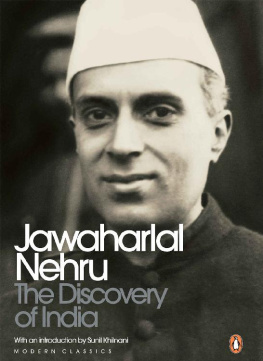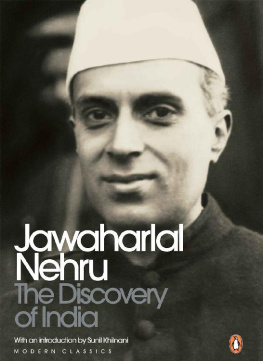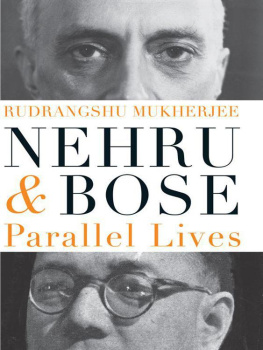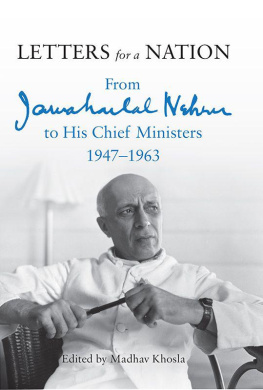Table of Contents

It was a great pleasure to go through the book compiled by PV Rajgopal from my husbands diaries on his years with Pandit Nehru. My husband and I were privileged to have had the opportunity of getting to know more about the man rather than just the public persona. It could be said that this was our tryst with destiny.
Mrs Naju Rustamji
As one who has served under KF Rustamji, I found him to be an extraordinarily perceptive, sensitive, compassionate and far-sighted person. He was a keen observer of men and events, who could objectively and precisely sum up his impressions in a few pithy phrases. His long and proximate association with Jawaharlal Nehru, that incredibly popular Indian leader, during a most crucial phase of Indian history, enabled Rustamji to look at the great Indian tamasha in a manner given to few other Indians of his generation. PV Rajgopal has done a remarkable job in editing an extensive and often disparate journal and turning the finished product into a highly readable account of independent Indias first few critical decades. The book is a valuable addition to Nehruana.
Kirpal Dhillon
(former Director General of Police, Punjab, Vice Chancellor, Bhopal University and Fellow, Indian Institute of Advanced Study, Shimla and author of Defenders of the Establishment .)
I find myself in a unique position in the context of this book. I knew both the main personalities in the textKF Rustamji as a professional, and Nehru because he was my elder uncle (Bade Phupha; Mrs Kamla Nehru was my fathers elder sister). Until 1964 I had a free run at the Teen Murti Bhavanthe Prime Ministers house and used to meet the great man in family gatherings.
As for Rustamji, my meetings began after 1970 and ended by 1998, when our paths got separated. It was during the period when Rustamji was with the National Police Commission that we found ourselves together on some sections of his tours and shared our views on police matters.
The reader will find the material in this book of immense research value on Nehru. We have till date tended to treat Nehru as a political persona. Here is an original insight into the human being that he was. The author has taken great pains to collect the facts and arrange them for the delight of the reader. Nehru emerges as never before, and so does his Boswell, who kept the details of the daily routines around the man and also looked after his security.
Pandit Gautam Kaul
(former DG, Indo-Tibetan Border Police and author of Cinema and the Indian Freedom Struggle.)
This book is based on original archives and covers the period from 1952 to 1958, when Prime Minister Jawaharlal Nehru was at his peak. As Nehrus Chief Security Officer, Rustamji closely observed how Nehru impacted on the people and this comes out very well in this book.
Dr Bhashyam Kasturi
(Associate Editor, Selected Works of Jawaharalal Nehru and author of Walking AloneGandhi and Indias Partition.)
About the cover
Jawaharlal Nehru consistently ignored the absolute minimum of precautions, refusing to travel in a closed car, which he called a cage, flaunting himself in an open car. Sometimes he got up on a bus or jumped up on the bonnet of the car or would sit on its mudguard and drive through a crowd, happy as a schoolboy out for a bit of adventure. Sometimes he got down and walked through the crowds which became wild with joy, seeing their favourite idol in their midst. It was partly due to these pranks that people took him to their hearts.
Nehru, who was extremely fond of fruits, always had with him bananas (which he called the fruit of travel) or apples in the car and kept munching them during travel (from KFRs diaries).
The photograph on the cover shows Nehru eating something while going from Bidar to Osmanabad (both places were then in Hyderabad state) in September 1952. KF Rustamji, his Chief Security Officer, is sitting next to him, wearing a sola topi.
The photographs are from Rustamjis own collection, except for those that are acknowledged separately.
i was nehrus shadow
FROM THE DIARIES OF
KF RUSTAMJI, IP , PADMA VIBHUSHAN
Edited by
PV RAJGOPAL

PV Rajgopal, 2006
First published 2006
Reprinted 2007
Second Edition 2014
All rights reserved. No part of this book may be reproduced, stored in a retrieval system or transmitted in any form or by any meanselectronic, mechanical, photocopying, recording or otherwisewithout the prior permission of the author and the publisher.
ISBN: 978-81-8328-330-4
Published by
Wisdom Tree
4779/23, Ansari Road
Darya Ganj, New Delhi-110 002
Ph.: 23247966/67/68
wisdomtreebooks@gmail.com
Printed in India
To
the memory of all those
gallant police and security personnel
who laid down their lives
protecting the lives of the
political leaders of the country.
Khusro Framroze Rustamji
KF Rustamji was born on 22 May 1916 at Kamptee near Nagpur, where he had his entire education. He did his schooling at St Francis De Sales School and MSc from College of Science in 1936. He worked as a Demonstrator in Zoology in the same college from 1936 to 1938.
In 1938, Rustamji was the only person selected from the erstwhile Central Provinces, now Madhya Pradesh (MP) for the Indian Police (IP), the forerunner of the present day Indian Police Service (IPS).
After serving as Superintendent of Police in some districts of MP, he was promoted in 1949 and posted to Aurangabad, which was then in Hyderabad state, as Range Deputy Inspector General of Police (DIG). He went on deputation to the Intelligence Bureau (IB) in 1952 where, as Deputy Director, he was in charge of the Prime Ministers security apart from other miscellaneous duties.
In 1958, at the age of 42, he became the youngest Inspector General of Police (IGP) of MP where he distinguished himself for the next seven years reorganising the police forces of four states which, some months earlier, had been merged to form the composite state of MP. Within a short period he made a name for himself with the elimination of several notorious dacoits of the Chambal ravines, including Rupa and Laakhan, the two main lieutenants of the legendary Man Singh. Among the others eliminated were Amritlal and Gabbar Singh.
In August 1965, a few days prior to the Indo-Pak war, he was specially selected by Prime Minister Lal Bahadur Shastri to head the newly formed Border Security Force (BSF). Starting as a one man force, in a span of nine years, he made it what it is today.
He served as Special Secretary, Ministry of Home Affairs from 1974-76, as member of the National Police Commission from 1978-83, as member, Police Research and Development Advisory Council in 1985 and member, National Integration Council in 1990. In recognition of the services rendered as DG, BSF during the Indo-Pak war in 1971, he was awarded the Padma Bhushan.
Rustamji was a prolific writer who wrote on various matters of topical interest affecting internal security and the police. His contributions after retirement from Service were recognised with the award of Padma Vibhushan in 1991.
The police icon, who became a legend in his lifetime, died on 2 March 2003 in Mumbai, leaving behind wife Naju, daughter Kerman, grand-daughter Zena, son Cyrus and daughter-in-law Namrita.

